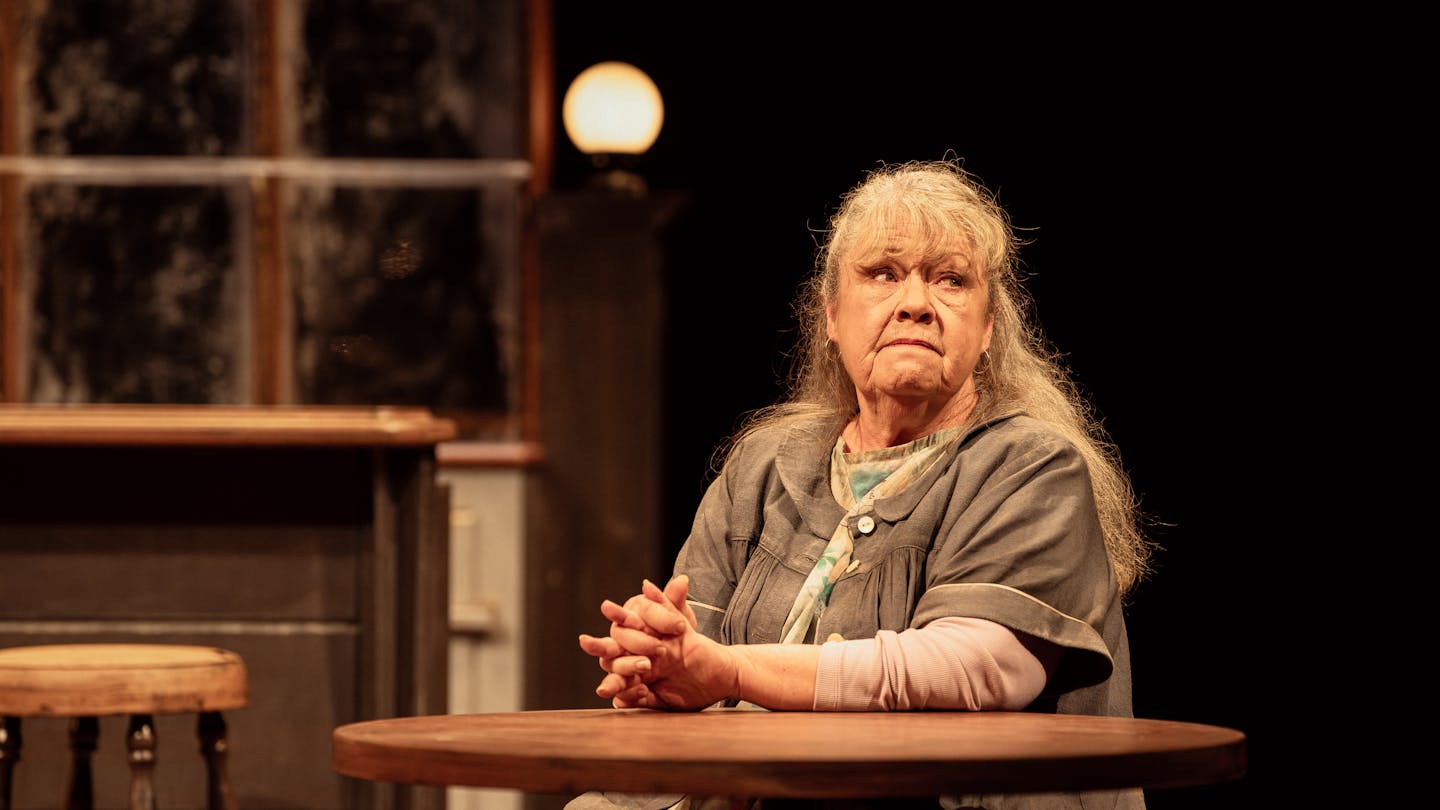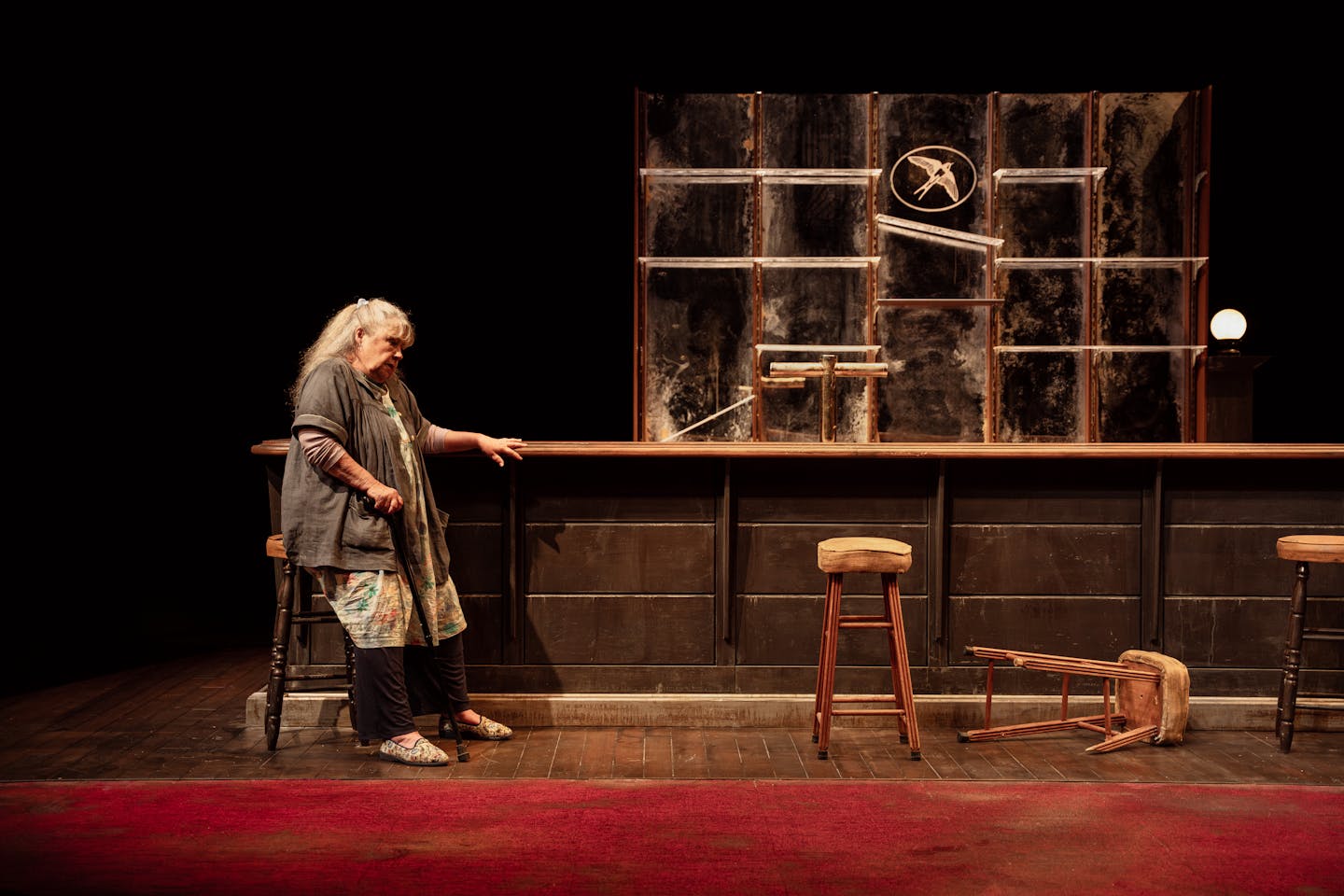
It’s an enticing proposition for a play: an aged barkeep shares snatches of memories as the small, inner-city Melbourne pub she’s inhabited since birth is slated for demolition.
Daniel Keene’s new play The Lark centres 75-year-old Rose Grey (played by beloved Australian actor Noni Hazlehurst) at this critical moment of closure and change.
Keene, Hazlehurst and director Matt Scholten are also the team behind Mother, a production that has been touring for the past decade.
Stories of loss, punctuated by humour
Memories shape the dramaturgical patchwork quilt of Keene’s new play.
Rose directly addresses the audience as she shares fragments of stories. She inherited the pub from her father after his retirement, and it is her entire life.
The lingering effects of an abandoning mother are seeded early and tighten the bond between Rose and her father – a bond which is transferred to the pub upon his death.
His death is a spectre that haunts the play. But there are small moments of humour, punctuated by Hazlehurst’s sharp delivery.
Throughout the play, Rose introduces the audience to memorable characters from the pub in short narrative bursts. People appear, have an impact on Rose, and just as quickly disappear. These are endearing, humour-filled stories that resonate strongly with the audience.
At the age of 19, Rose makes a break for it, to get away from the pub and the all-consuming relationship with her father. She makes it as far as Warrnambool before making the slow, embarrassing train ride back through the western suburbs to the inner north.
Rose’s whole life plays out in the pub. She relays the details of losing her virginity, forming friendships with other local women, and ultimately becoming the publican as her father falls ill.
His death is a slow and agonising process. Decades later, Rose still grapples with this debilitating loss, while facing the razing of the pub and the realities of her own decline.
Keene crafts lyrically beautiful lines within these short, fragmented narratives.
Heavy-handed design elements
However, while the proposition for intimate and humorous storytelling by a witty, aged barkeep is enticing – and possibly successful in Keene’s writing – Scholten’s direction ultimately stifles the production’s tone.
A very literal decrepit pub forms the main part of Emily Barrie’s set design. Hazlehurst moves between this space, a small table and chair near the front of the stage, and standing directly in front of the audience.
The performer shines when seated downstage or standing close to the audience. This proximity allows for intimate connection with the audience, and forces greater nuance in her delivery. The large, drab pub is an unnecessary and burdensome visual crutch.
Richard Vabre’s lighting also does little to create dynamics or changes in the energy and mood until a few rather lovely moments toward the end of the play. In some key moments, Hazlehurt’s face is cast in shadow – an effect no actor appreciates when working hard to convey complex emotion.

Sound design by Darius Kedros blankets the play in silence, adding weight to what are already grief-laden scenes. The repeated use of a cinematic-inspired soundscape underneath Rose’s dialogue about her father becomes predictable, and ultimately undermines the emotional nuance it seems intended to stir.
Hazlehurst, for the most part, remains behind the action of the dialogue rather than steering it. Between Scholten’s paint-by-numbers approach to directing movement and the lacklustre design elements the talented performer is inhibited.
Hazlehurst and Keene shine
Keene’s writing and Hazlehurst’s turn as Rose are the real forces of power in this production.
Scholten’s direction suffocates the delicacy of what Keene tries to balance in the dialogue: a coexistence of beauty, humour, pain and loss.
Heavy-handed design elements seem to favour imposing mood over complementing the complex character study Hazlehurst attempts to bring to life onstage. As a result, the production collapses with a profound sense of grief.
The Lark is at Fairfax Studio, Arts Centre Melbourne until September 28.
This article is republished from The Conversation, a nonprofit, independent news organization bringing you facts and trustworthy analysis to help you make sense of our complex world. It was written by: Jonathan Graffam-O’Meara, Monash University
Read more:
- Why do we ‘like a version’ so much? The history of cover songs, from Elvis to TikTok
- Impressive performances and production values – but Joanna Murray-Smith’s The Talented Mr. Ripley doesn’t quite land
- Destiny is a fierce new stage show exploring love, loss and rebellion under the shadow of apartheid South Africa
Jonathan Graffam-O’Meara does not work for, consult, own shares in or receive funding from any company or organisation that would benefit from this article, and has disclosed no relevant affiliations beyond their academic appointment.


 The Conversation
The Conversation
 NBC10 Boston Entertainment
NBC10 Boston Entertainment Raw Story
Raw Story